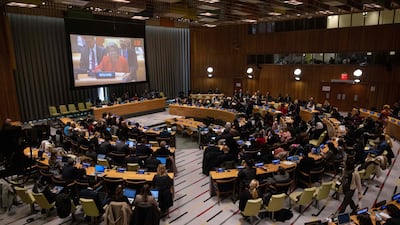In an unprecedented vote, world powers at the UN headquarters in New York voted on Wednesday in favour of booting Iran from the body given the task of protecting and empowering women.
A total of 29 states voted in favour of the resolution while eight were against, including China, Nigeria, Oman, Russia. Sixteen countries abstained.
The adoption of the resolution, which calls for the removal of Iran with “immediate effect”, marks the first time a member of the Commission on the Status of Women — an organ of the UN’s 54-member Economic and Social Council — has been removed.
Before the vote, Washington’s top envoy to the UN, Linda Thomas-Greenfield, said Iranian women and activists had appealed to the US and the world body for support.
“They made their request to us loud and clear: remove Iran from the Commission on the Status of Women," she said.
"The reason why is straightforward: the commission is the premier UN body for promoting gender equality and empowering women. It cannot do its important work if it is being undermined from within.”
She described Iran’s membership is an “ugly stain on the commission’s credibility”.
Iran began a four-year term on the commission this year and became a member of the UN Economic and Social Council (Ecosoc) in 2016 by gaining the necessary votes at the UN General Assembly.
The Commission on the Status of Women comprises 45 countries, elected every four years by Ecosoc, based on equitable geographical distribution.
Australia, Albania, Canada, Guatemala, Israel, Liberia, New Zealand, North Macedonia, and UK and Northern Ireland co-sponsored the US draft resolution which calls for the removal of Iran.
Iran’s ambassador to the UN, Amir Saeid Jalil Iravani, told Ecosoc members that he was not surprised that the US was taking “such unlawful action against Iran, given its longest standing hostility towards the Iranian people”.
He accused the US of making it a standard practice to “abuse and derail such valued concept as human rights in order to achieve its legitimate political goal".
"And it has achieved so by utilising UN platform and resources," he said.
On Monday, Iran and 18 states including China, Russia, Algeria, Syria and Palestine, sent a letter to Ecosoc urging members to vote against the US draft resolution to avoid “the establishment of a dangerous precedent that could become the new trend for expelling sovereign and rightfully elected states from any given body of the international system”.
US National Security Advisor Jake Sullivan described the vote as "another sign of the growing international consensus on Iran and demands for accountability."
The US-led efforts came as Iran’s hardline regime has faced protests after the September death of 22-year-old Mahsa Amini, who was detained by Iran’s morality police for allegedly violating the country's strict dress code for women.
The demonstrations, initially sparked by anger over Iran's restrictions on women, are now calling for the downfall of the regime that has ruled the country since 1979.
Two people have already been executed after participating in the protests, with both cases drawing outcry at home and abroad.
Before the 1979 Islamic revolution, many Iranian women wore western-style clothes, but this all changed when the late Ayatollah Khomeini came to power. The regime mandated that women and girls over the age of nine would need to dress modestly and cover their hair in public.
Iranian activist Masih Alinejad, who is the behind the "White Wednesdays" campaign that began 2017, told The National the country should never have been elected to the women's commission.
“For a regime that is anti-woman, it is diabolical that as many as four western countries voted to have Islamic Republic on the CSW," she said.
"First, there is the compulsory hijab issue: women cannot even determine how to dress, and that's just the beginning.
"Women are treated as second-class citizens, discriminated against constantly. Just remember, a woman cannot get a passport or get a job or go to university without the permission of her husband or father.”
Ms Alinejad, who has called on the European Union to recall diplomats from Iran, said removing Iran from the commission sends “a signal to Iranian protesters that the world has heard their protests and is on their side”.
"Today’s justified action by UN member countries" said Louis Charbonneau, UN director at Human Rights Watch, "is a far cry from real accountability for those responsible for the security forces’ lethal violence against protesters after the death of Mahsa Amini, including many women and girls, and the execution of protesters after hasty unfair trials."
"What’s needed is urgent, co-ordinated pressure on Iran to end its campaign of violence, credible prosecutions of individuals who are directly responsible for these appalling violations of human rights, and an end to the severe discrimination against women.”


